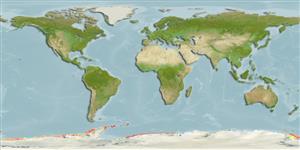Symplectoscyphus sofiae Peña Cantero, Svoboda & Vervoort, 2002
| Native range | All suitable habitat | Point map | Year 2050 |

|
| This map was computer-generated and has not yet been reviewed. |
| Symplectoscyphus sofiae AquaMaps Data sources: GBIF OBIS |
Google image |
No photo available for this species.
Classification / Names Populärnamn | synonymer | CoL | ITIS | WoRMS
Hydrozoa | Leptothecata | Sertulariidae
Environment: milieu / climate zone / djupintervall / distribution range Ekologi
Bottenlevande; djupintervall 420 - 470 m (Ref. 7416). Polar
Distribution Länder | FAO områden | Ekosystem | Förekomster | Utplanteringar
Antarctic Pacific: Antarctica.
Length at first maturity / Size / Weight / Age
Könsmognad: Lm ? range ? - ? cm Max length : 7.5 cm H hane/ej könsbestämd; (Ref. 7416)
Short description Morfologi
Life cycle and mating behavior Könsmognad | Reproduktion | Lek | Eggs | Fecundity | Larvae
Main reference
referenser | Koordinator | Medarbetare
Peña Cantero, A.L., A. Svoboda and W. Vervoort 2002 Species of Stymplectoscyphus Marktanner-Turneretscher, 1980 (Cnidaria; Hydrozoa: Sertulariidae) from recent Antarctic expeditions with R.V. Polarsten, with the description of four new species. Journal of Natural History 36:1509-1568. (Ref. 7416)
IUCN Red List Status
(Ref. 130435: Version 2025-1)
CITES status (Ref. 108899)
CMS (Ref. 116361)
Threat to humans
Human uses
| FishSource |
Verktyg
Ytterligare information
Födosammansättning
Födointag
Predatorer
Max. ages / sizes
Length-weight rel.
Length-length rel.
Length-frequencies
Mass conversion
Abundans
Internet-källor
BHL | BOLD Systems | CISTI | DiscoverLife | FAO(Publication : search) | Fishipedia | GenBank (genome, nucleotide) | GloBI | Gomexsi | Google Books | Google Scholar | Google | PubMed | Tree of Life | Wikipedia (Go, sök) | Zoological Record


